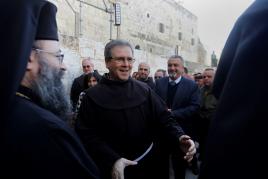CHRISTMAS
The Custos of the Holy Land, Father Francesco Patton, refreshes the memory of a passage from Ungaretti’s poem, Christ, “An incarnate star among the darkness of humanity’: “it’s a tragedy not a farcical comedy.” This tragedy enjoins mankind to be illuminated by the Light and fulfil “the dream of the Lord”: humanity’s salvation

“A tragedy not a farcical comedy”
 “A tragedy not a farcical comedy”: it’s Christmas in the eyes of the Custos of the Holy Land Father Francesco Patton. “It’s a tragedy.” The Franciscan Father reiterates the phrase as if to make sure it has been fully understood. Just like a tragedy… Christmas, the solemn Christian celebration of the incarnation of Jesus, God of peace, is a tragedy? “It is – he replied with even greater emphasis -.
“A tragedy not a farcical comedy”: it’s Christmas in the eyes of the Custos of the Holy Land Father Francesco Patton. “It’s a tragedy.” The Franciscan Father reiterates the phrase as if to make sure it has been fully understood. Just like a tragedy… Christmas, the solemn Christian celebration of the incarnation of Jesus, God of peace, is a tragedy? “It is – he replied with even greater emphasis -.
Christmas is the tragedy of a God that is Light from Light and that penetrates a dark history in order to illuminate it. Darkness did not overcome the Light, yet it failed to embrace it.” These words from the Prologue to John’s Gospel further clarify this concept. On the same lines, Father Patton brings to mind the verses of a poem by Giuseppe Ungaretti, titled “You too are my river”, reflecting the poet’s experience during World War II. Father Patton quotes one of its most significant passages by heart: “Singing praise to Christ, the poet writes,’ Christ, An incarnate star among the darkness of humanity, Brother who ceaselessly sacrifices graciously to rebuild man.’ This is the tragedy of Christmas.”.
It’s a tragedy that challenges Christians in the Middle East who “will be living out these days with intense liturgical zeal, which is rarely seen in Western societies, within a situation marked by tensions and concerns.”  This is true for example, for “those living in the poorest areas of the West Bank or Gaza. Those living in Syria whose Christmas will be spent praying every day that war will end for good, and that it will be replaced by a path of reconciliation and reconstruction; for Christians living in Syrian villages along the Orontes river with a strong Jihadist presence, hoping to recover a peaceful life and to restore crosses on bell towers, to return to make the manger and to wear their religious habit. Let us remember the thousands of Christian refugees in Turkey, Lebanon and Jordan. In their tragedy they cherish hopes of Goodness, with a capital G, not only of ‘goods’”. But the tragedy of Christmas that “wants the light to shine on the darkness of the history of mankind” is also found in events experienced during this past 2018: the transfer of the US embassy from Tel Aviv to Jerusalem, the controversial law on the Jewish State, the failure of intra-Palestinian reconciliation, the rockets fired against Israel, the protests and the death toll in Gaza, the stabbings…
This is true for example, for “those living in the poorest areas of the West Bank or Gaza. Those living in Syria whose Christmas will be spent praying every day that war will end for good, and that it will be replaced by a path of reconciliation and reconstruction; for Christians living in Syrian villages along the Orontes river with a strong Jihadist presence, hoping to recover a peaceful life and to restore crosses on bell towers, to return to make the manger and to wear their religious habit. Let us remember the thousands of Christian refugees in Turkey, Lebanon and Jordan. In their tragedy they cherish hopes of Goodness, with a capital G, not only of ‘goods’”. But the tragedy of Christmas that “wants the light to shine on the darkness of the history of mankind” is also found in events experienced during this past 2018: the transfer of the US embassy from Tel Aviv to Jerusalem, the controversial law on the Jewish State, the failure of intra-Palestinian reconciliation, the rockets fired against Israel, the protests and the death toll in Gaza, the stabbings…
How should these facts be interpreted in the history of God who became man “to rebuild his humanity’, as Ungaretti writes?
“As believers”, the Custos said, “and with the same predisposition of the Holy Virgin as she read the history of her time and praised it in the Magnificat. God dethroned the powerful and elevated the humble, he filled the hungry with goods and sent back the wealthy empty-handed.
Reading through the lenses of the faith helps us extend our gaze beyond the events we experience, without overlooking them
And it helps us identify the direction of history’s course wanted by God.” By doing so “we find ourselves in the dream of God, participating in His plan of salvation for us, in His ideal of history and the experience of disasters that was common also at the time of Mary.” Between the present history and the dream of God “stands our faith as well as our personal, great responsibility and that of decision-makers, a daily responsibility that we practice by supporting certain visions of life and not others, thereby becoming either peace-builders or hate-mongers. It is a an endearing path that requires time and patience.” Father Patton remarked: “we wish that all difficult situations were resolved in the blink of an eye, that conflicts were settled in a negotiating session and that economic hurdles were overcome as the result of wise decisions. But these issues require long processes that involve our very humanity and responsibility as well as those of State leaders.”
 The Christmas wishes of the Custos cannot be but the following:
The Christmas wishes of the Custos cannot be but the following:
“may the dream of God come true within each one of us, may we be capable of cherishing hope, without becoming unduly pessimistic. Mary and the prophets teach us to be harbingers of hope in hard times.”The wish is also “the fulfilment of Isaiah’s prophecy; ‘they shall beat their swords into plowshares, and their spears into pruninghooks: nation shall not lift up sword against nation, neither shall they learn war any more.’ And may all cutting-edge technology designed to bring suffering and death become a technology in favour of mankind. May the light of Christmas be embraced and may it penetrate the darkness, including our own personal darkness, in order to brighten it.”